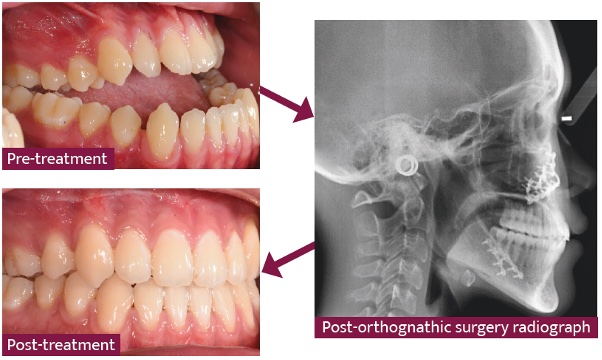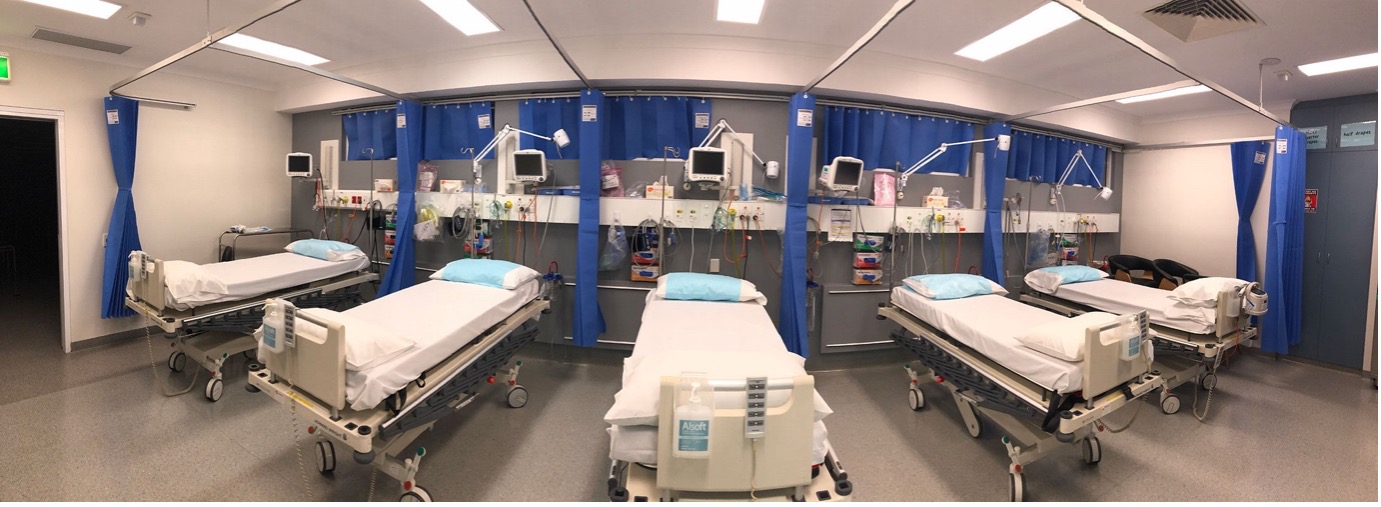Surgical treatment may be recommended in conjunction with Orthodontics to correct your bite and/or change your facial profile. In some cases, treatment is planned to improve your bite, with minimal change to your facial appearance, whilst in other cases, there will be more noticeable change to your facial appearance -for example if you have a prominent or smaller lower jaw (mandible). Surgery may also be suggested to address breathing difficulties such as sleep apnoea.
Is there an alternative to this treatment?
Surgery to address your situation is entirely optional. You will need to ask your Orthodontist, about probable outcomes if you do not wish to take a surgical path. They will explain the advantages and disadvantages of all options. You may nominate to have braces only treatment accepting any limitations or discrepancies of the facial profile or bite.
What is Surgical treatment?
This type of treatment is typically carried out over a period of 2-3 years, starting with orthodontic treatment to reposition your teeth with fixed top and bottom braces. Your Orthodontist works very closely with your nominated Oral Surgeon who will perform the Surgery. Once teeth are in an optimal position you will be ready for the jaw surgery, and the braces will stay in place during this phase.
Following the surgery, patients generally continue with their orthodontic treatment with fixed appliances for another 6-9 months.
When the fixed appliances are removed you will be provided with removable retainers which will help maintain your teeth in the new position. Some patients will also require a retainer fixed to their teeth. The orthodontic team will advise you how often you should wear your retainers, usually a period of full-time wear and then reducing to night time wear, further reducing to a few nights a week indefinitely.
What does the Surgery involve?
Jaw surgery may involve surgery to your upper jaw (maxilla) or the lower jaw (mandible) or a combination of both depending on your concerns and individual assessment by the Orthodontist and Oral Surgeon. The surgery is carried out from inside your mouth so there are no visible scars on your face. For some types of surgery there may be a tiny cut made at the angle of the jaw. However, this is virtually invisible a few weeks after the surgery. During jaw surgery your jaws are repositioned and held in their new position by small screws and plates beneath the gum (see x-ray below), which are generally left there indefinitely. You will be biting into a custom-made wafer and will be required to wear orthodontic elastics, whilst your bite settles.

Risks associated with jaw surgery
Lip numbness: This is normal, immediately after the surgery. The upper lip recovers quickly; however, the lower lip is much more variable and may take time to recover. Some patients report areas of permanent numbness which does not affect the appearance of the lip or its function. Patients reporting areas of permanent altered sensation find that this is something they get used to.
Infection of the plates may occur beneath the gum: In a small number of cases the metal plates and screws may become infected. If this is the case they are removed. The chance of this occurring is greater if you smoke cigarettes. Patients are advised to stop smoking if they are planning to undergo surgery.
Relapse after surgery: This is unusual. However, there may be a relapse in the position of the jaws or the teeth. This is usually due to poor post-surgical compliance and/or poor retainer wear.
These risks can sound scary, however jaw surgery is now considered routine and is performed in a very controlled and planned fashion. Talk with your Surgeon and Orthodontist if you have concerns regarding these risks prior to comitting to the surgical process as many of them can be controlled or greatly reduced.
Hospital and Recovery period
Most patients only stay in hospital for one night, and need between 2-4 weeks off work/ college/university. The speed of recovery varies from patient to patient. You will probably be swollen after the operation with the swelling of the face at its worst 36-48 hours after the operation. This usually improves over the following 2 to 3 weeks with your final facial appearance being apparent over a few months.
The amount of change in your facial appearance will depend on whether your surgery was planned to have minimal or a more noticeable effect on your appearance. It is not unusual for patients to feel down after the surgery. It can take time for patients to get use to their new bite and facial appearance.
Care after the surgery
Most patients will lose some weight after surgery until their eating regime returns to normal. Your mouth opening will be reduced after surgery due to swelling, so you should eat soft foods (soups, smoothies, yogurt etc.) Over the next few weeks, you should gradually return to a normal diet, avoiding hard foods for up to six weeks while you heal. Tooth brushing is very important throughout treatment but especially so after surgery. You are advised to use a soft toothbrush for the first few weeks after surgery to make sure you remove food debris and plaque. You may also be advised to use warm salt rinses or over the counter mouthwashes.
The Oral Surgeon will review you after 2-3 weeks to check progress and remove the surgical wafer. Your Orthodontist will review your braces a few weeks after this.
